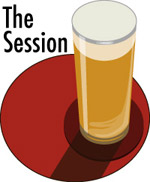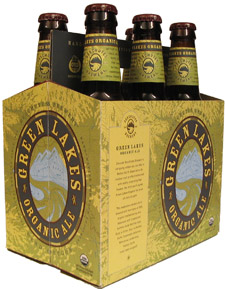 Don’t know how many of you frequent growers’ markets, so a quick description of how buying sweet corn works around here.
Don’t know how many of you frequent growers’ markets, so a quick description of how buying sweet corn works around here.
Quite often vendors will have the top of ears pealed back. This is so you can see how much damage the ear worm has done. When we get home we lop the portion the worm is still living in, soak the corn and cook it (often on the grill).
Does it taste great because it is organic, because it is fresh, maybe for both reasons?
I don’t know for sure. Just like a don’t know the answer to the next question. Should organic beer taste better, or at least somehow different?
A question I ask because the topic for The Session #13 today is organic beer. Host Chris O’Brien has the roundup.
So the beer I am contemplating this with is Green Lakes Organic Ale from Deschutes Brewery. A nice beer, though it wouldn’t make me give up Mirror Pond Pale Ale (to pick another from Deschutes). It gets points for making a fresh impression — logically or not, that’s something I expect from an organic beer.
 Some of that is shortbread sweetness on the palate, and much of it is a solid dose of hops (the brewery reports this beer is 45 IBU, meaning significant bitterness). It’s on the edge, or for some it has probably gone over, of being dishwater harsh. I like the combination of apricot/peach and pine aromas, plus a bit of spiciness that lasts through the finish.
Some of that is shortbread sweetness on the palate, and much of it is a solid dose of hops (the brewery reports this beer is 45 IBU, meaning significant bitterness). It’s on the edge, or for some it has probably gone over, of being dishwater harsh. I like the combination of apricot/peach and pine aromas, plus a bit of spiciness that lasts through the finish.
It’s not clear all the hops are organic — in fact, I think not. There’s a whole ‘nother issue on if beers need to contain organic hops to be called organic, and let’s pass on that today. Deschutes does brag that the beer includes certified Salmon-Safe Sterling hops (perhaps explaining the spicy notes). That’s a good thing. Deschutes also went to the trouble of getting organic certification for the 50 barrel brewhouse which produces Green Lakes. Another good thing.
Back to what organic beer should taste like. For instance, Mateveza Yerba Mate, brewed with a South American energy tea under contract at Butte Creek (which makes its own organic beers) has definite herbal qualities leaving you with the thought This is different.
But beyond the obvious, there are other reasons to think organic ales might actually taste better. No doubt some companies, not just those selling beer, see consumer interest in all things organic as nothing more than a business opportunity. It seems more likely, however, that a brewer who goes to the trouble or a barley farmer who goes to the trouble doesn’t view organic as a gimmick. Effort tends to make things better.
In fact, don’t let brewer-owner Christian Ettinger at Hopworks Urban Brewery in Portland get started on the high quality of organic malt he has available to him without a full glass of beer in hand. You are going to be there for a while.
Speaking of which, I hope somebody found a HUB beer for today’s Session. Check the roundup to find out.
 In setting the theme for The Session #14: Beer People Jeff Bell asked for “pen portraits.”
In setting the theme for The Session #14: Beer People Jeff Bell asked for “pen portraits.” Some of that is shortbread sweetness on the palate, and much of it is a solid dose of hops (the brewery reports this beer is 45 IBU, meaning significant bitterness). It’s on the edge, or for some it has probably gone over, of being dishwater harsh. I like the combination of apricot/peach and pine aromas, plus a bit of spiciness that lasts through the finish.
Some of that is shortbread sweetness on the palate, and much of it is a solid dose of hops (the brewery reports this beer is 45 IBU, meaning significant bitterness). It’s on the edge, or for some it has probably gone over, of being dishwater harsh. I like the combination of apricot/peach and pine aromas, plus a bit of spiciness that lasts through the finish.